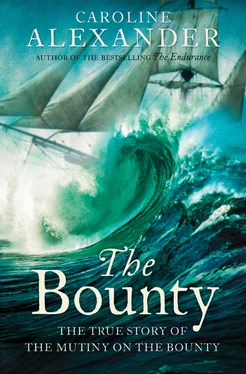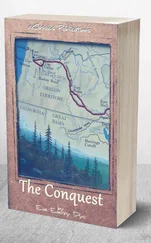The Bounty dropped anchor in Adventure Bay off the southern coast of Van Diemen’s Land, now Tasmania, seven weeks after departing the Cape. The passage had seen ferocious weather and much severe lightning; once the Bounty had been pitched almost on her beam ends, but as Bligh logged, ‘no damage was done but the overturning [of] some Tubs with Plants I had brought from the Cape.’ The plants were intended as useful gifts for the Tahitians.
With his ship safely anchored, Bligh set out by boat to scout the surroundings. The largely mountainous land appeared unchanged from when he, along with Nelson, Peckover and Coleman, had been here with Cook. Among the stands of massive trees that overlooked the island-studded bay, Bligh examined stumps that had been cut for the Resolution , eleven years previously. Later, Thomas Hayward pointed out to Bligh a tree trunk carved with a date from Cook’s second expedition, ‘as distinct as if it had not been cut a Month, even the very slips of the Knife were as discernable as at the first Moment.’ There was much Bligh encountered at Adventure Bay to put him in mind of his own voyage with Cook; ‘I cannot therefore help paying this humble tribute to Captn. Cook’s memory,’ he reflected in his log, ‘as his remarkable circumspection in many other things has shown how little he has been wrong.’
The following morning, Bligh divided his men into different parties, and sent them out on various duties. He had determined to work from Cook’s old base, where a gully disgorged water conveniently close to the chosen landing. One man was detailed to wash all dirty linen, while Nelson and his assistant, William Brown, set out to explore the country. Acting Lieutenant Fletcher Christian and William Peckover, the experienced and reliable gunner, were put in charge of the parties detailed to cask water and fell wood.
The weather blew squally, then fair, then squally with rain and rapid, racing clouds throughout the following days. The watering party rolled casks of water along the beach, loading them with difficulty into the waiting boats. The surf was troublesome enough to require the wood party, under Christian, to raft the timber out in bundles. In off-hours, some of the men went shooting and fishing with mostly disappointing results, although two black oystercatchers, largish black-and-white birds with long red bills, were shot by Mr Christian. All the men kept an inquisitive lookout for local people, but it was some days before any turned up. Dressed in little but kangaroo skins and with painted faces, they appeared to the Bounty men as ‘the most miserable creatures on the face of the Earth,’ as James Morrison bluntly put it.
On 23 August, there was the first unequivocal sign of trouble. Going onshore to inspect the various work parties, Bligh found William Purcell, the carpenter, cutting crude, unwieldy billets of wood. When Bligh complained that the billets were too long, Purcell accused his captain of coming onshore ‘on purpose to find fault’. Words were exchanged, Purcell became insolent and Bligh lost his temper and sent the carpenter back to the ship.
Now Bligh was made to feel the consequences of his inconveniently small company. He had no commissioned officer to turn to for authority and moral support – and no marines to back him up. Under the Articles of War, Purcell’s refusal to obey Bligh’s commands – let alone insolently talk back to him – was an offence punishable by court-martial. Yet, the prospect of holding a court-martial was well over a year away.
‘I could not bear the loss of an able Working and healthy Man,’ Bligh logged; ‘otherwise I should have committed him to close confinement untill I could have tryed him.’ As a warrant officer, the carpenter could not be flogged, and Bligh could find no recourse but to order him back to the ship to assist Fryer in other duties. Purcell seems to have had a keen appreciation of Bligh’s dilemma, for three days later Bligh was forced to log a second, lengthy complaint against him for disobeying Fryer’s orders to help load water.
Fryer informed Bligh of Purcell’s disobedience when Bligh returned to the ship with other members of the shore parties, who would have watched the encounter closely. Facing the broad Pacific and backed by a mountainous land so remote that only four ships from the outside world had ever previously touched it, Bligh had only his own authority with which to confront the carpenter.
‘My directions and presence had as little effect,’ Bligh recorded ominously. Purcell had refused to back down. Confinement of Purcell until such time as he could be brought to court-martial would rob Bligh of the carpenter’s skills and, in theory, other able-bodied work. Or so Bligh himself reasoned as he matter-of-factly devised a novel form of punishment: ‘I therefore Ordered the different Persons evidence to be drawn out and attested, and then gave Orders that untill he Worked he should have no provisions, and promised faithfully a severe Punishment to any Man that dared to Assist him.’
Bligh was satisfied with the result of this action, ‘which immediatly brought [him] to his senses…It was for the good of the Voyage that I should not make him or any Man a prisoner,’ Bligh concluded his account of the event. ‘The few I have even in the good State of health I keep them, are but barely sufficient to carry on the duty of the Ship.’
James Morrison gives an oblique, deliberately evasive reference to the confrontation, from which it is impossible to cull hard facts. But a single statement is unambiguous: here, says Morrison, in Adventure Bay ‘were sown seeds of eternal discord between Lieut. Bligh & the Carpenter, and it will be no more than true to say, with all the Officers in general.’ Fryer was probably one of these other officers; Bligh’s observation that he had to repeat his orders to the master (‘I repeated my injunctions to the Comm’g Officer Mr. Fryer’) is subtly troubling. Christian was in charge of the wood party, whose task of rafting timber through heavy surf seems to have been particularly difficult; now under personal obligation to Bligh, had he too been found lacking?
Bligh’s log ticked on, with descriptions of native encounters, lists of shrubs and herbaceous plants, and careful surveys of adjacent land. For him, the crisis with the carpenter had been satisfactorily addressed and the incident was closed.
The Bounty left the wooded shores of Adventure Bay on 5 September and headed into more wet, misty weather. A few days out, the southern lights, ‘as Red as blood’, inflamed the clouded sky. At night, phosphorescent medusae, long-tentacled jellyfish, glowed from beneath the sea. South of New Zealand, the ship unexpectedly came upon ‘a parcell of Rocky Islands’, devoid of all greenery, but patched with late snow – a discovery. Their position was duly laid down by Bligh and logged. ‘I have called them the Bountys Isles,’ he recorded solemnly.
The Bounty ploughed onward through often dark, cloudy weather and thick fogs, punctuated with gales of rain. Bligh’s log checked off each day’s consumed miles: 177, 175, 141. From England to Tahiti, the Bounty would eventually log 28,086 miles. Between his duties on deck, Bligh retired amid the pots to his cabin, and there, while his ship thrummed through the Pacific swells, carefully wrote up his log, made his natural history observations, and refined his charts and sketches. The odds and ends of plants he had collected at the Cape for Tahiti held majestic sway over the great cabin, where he checked them approvingly from time to time. There are few more touching images in his ship’s saga than this, the industrious lieutenant conscientiously acting the role of Captain Cook in his own miniature ship.
Читать дальше












